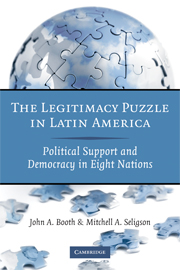Book contents
- Frontmatter
- Contents
- List of Figures
- List of Tables
- Preface
- 1 The Legitimacy Puzzles
- 2 The Structure of Legitimacy
- 3 Countries in the Study
- 4 The Sources of Political Legitimacy
- 5 Legitimacy and Political Participation
- 6 Legitimacy and Negative Political Capital
- 7 Legitimacy and Democratic Values
- 8 The Sky Is Not Falling: The Puzzle Solved
- Appendix A Supporting Data and Analyses for Chapters 1–5
- Appendix B Variables Used in the Analyses
- Appendix C System-level Performance Measures
- Appendix D Nonsampling Errors, Sampling Errors, and Design Effects for the Eight-Nation Survey
- Appendix E Method of Constructing the Legitimacy Factor Scores
- References
- About the Authors
- Index
4 - The Sources of Political Legitimacy
Published online by Cambridge University Press: 05 June 2012
- Frontmatter
- Contents
- List of Figures
- List of Tables
- Preface
- 1 The Legitimacy Puzzles
- 2 The Structure of Legitimacy
- 3 Countries in the Study
- 4 The Sources of Political Legitimacy
- 5 Legitimacy and Political Participation
- 6 Legitimacy and Negative Political Capital
- 7 Legitimacy and Democratic Values
- 8 The Sky Is Not Falling: The Puzzle Solved
- Appendix A Supporting Data and Analyses for Chapters 1–5
- Appendix B Variables Used in the Analyses
- Appendix C System-level Performance Measures
- Appendix D Nonsampling Errors, Sampling Errors, and Design Effects for the Eight-Nation Survey
- Appendix E Method of Constructing the Legitimacy Factor Scores
- References
- About the Authors
- Index
Summary
So far we have shown that political legitimacy in eight Latin American countries is multidimensional, but we do not yet know the sources of these legitimacy norms. Among the many aspects of society, politics, and individual traits, which factors contribute to higher or lower levels of the six dimensions of legitimacy we have identified? This deceptively simple question has interested legitimacy theorists, but empirical work to date, limited by the lack of a comprehensive multidimensional view of legitimacy, has not yet tested a comprehensive explanation. The goal of this chapter is to seek to answer this question and to provide the most comprehensive explanation possible for the eight countries studied here.
Prior research, cited extensively in Chapter 1, has pointed to three main sources of legitimacy norms: the macrosocial performance of the political system, individual attributes of citizens, and citizens' attitudes and experiences at the microsocial level. The better governments and their economic systems perform, the argument goes, the more likely it is that citizens will evaluate them positively (Hayen and Bratton 1992; Pritchett and Kaufmann 1998; Diamond 2008). On this point there has been much research that has tended to distinguish between longer-term and shorter-term performance. Longer-term factors supposedly influence, to use Easton's term, “diffuse support,” while shorter-term performance has a greater effect on more “specific support.” However, while that research has been skillful and often comparative, much of it has not clearly distinguished among multiple legitimacy dimensions and their various predictors.
- Type
- Chapter
- Information
- The Legitimacy Puzzle in Latin AmericaPolitical Support and Democracy in Eight Nations, pp. 105 - 143Publisher: Cambridge University PressPrint publication year: 2009
- 2
- Cited by



